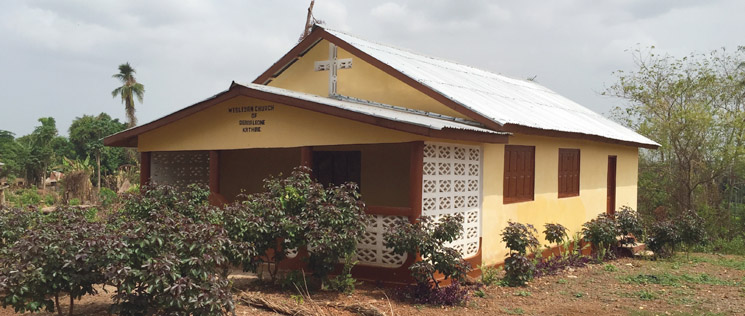
Village Partnerships: Kathirie
Partner: Grace Point Church
Population: 448
Households: 76
Status: Complete
Location: Bombali District, Sierra Leone
Village History
Kathirie is located on top of a hill five miles northeast of Makeni. Prior to any World Hope International involvement, the village was in desperate need of clean water. Without a safe, year-round water supply, people were forced to consume contaminated water, which caused diarrhea, dehydration and even death, especially among young children. A lack of sanitation facilities in the form of ventilated pit toilets, as well as a lack of knowledge about how disease is spread led to poor hygiene and, consequently, the spread of preventable illness.
In addition to clean water, the village was also in need of a secure food supply. The majority of villagers in Kathirie are small scale farmers because the land is suitable for rice cultivation and the rearing of domestic animals. Traditionally, farmers save seeds for next year’s planting, however the people of Kathirie have endured “hungry months” during the dry season as they do not have enough seeds to produce staple crops, including rice and peanuts, to last all year. Any surplus harvest is put at risk of being damaged or stolen by pests as no secure storage facility was built in the village. These realities prevented the achievement of full food security.
Finally, the village also lacked a proper education system. There is a community school in the village, with classes for first through fourth graders. After fourth grade, children must walk three miles to the nearest primary school because of insufficient seating accommodations and a shortage of trained teachers.
Completed Activities & Impact
Grace Point Church formed a partnership with the village of Kathirie in December 2013. Facilitated by WHI, Grace Point’s generosity helped to promote leadership development, hygiene training and education, food storage, spiritual growth, Ebola recovery and prevention, and improved farming techniques. Please see below for some of our completed activities.
Clean Water Wells and Sanitation
A new borehole well was drilled in October 2013. The well brings a consistent source of clean water year-round, a welcome reprieve from the previously existing hand-dug well.
Economic Development
Previously, WHI worked with the village to form and train a Village Development Committee (VDC), which included women to empower them in a very male dominated society. During the first few months of the partnership, initial training was given to VDC members and they are then tasked to teach others in the village.
Early in 2014, additional VDC training was provided to help leaders with conflict resolution, collection strategies and disseminating information to the community.
In 2015, a Community Center was erected, which is important in the long-term development of the village. VDC members meet at the center and hold community meetings and elections. Mobile clinics are able to utilize the space to assist with the medical needs in the village.
Agriculture
One limiting factor for food production is the lack of seeds and proper storage for seeds. WHI established a seed bank within the village, which is managed by the VDC. Before planting, farmers are given a seed “loan”, which they are responsible for paying back at harvest. Any additional seeds that the harvest yields are used as food or sold as income generation. The seeds in the seed bank are kept in a safe place for replanting the next season.
In April 2014, 60 bushels of peanut seeds were distributed to the community. WHI staff regularly visits the village to monitor VDC progress and to join them in planning the next phases of their community development. Farmers are taught better methods for selecting seeds and preserving them for next year’s planting and how to protect seeds and crops from pests.
In June 2014, a drying floor was completed bringing long term benefit to the community. WHI has found that drying floors significantly reduce post-harvest losses of staple crops. Rice, peanuts, peppers and other crops are spread on floors to get maximum sun exposure and to reduce moisture so that they do not mold.
In 2016, Kathirie constructed a new grain store. With the new store, farmers will be able to protect their grains and seeds from dirt, moisture and animals such as rats, mice and bugs.
Health and Nutrition
In 2014, WHI led Ebola prevention activities. During the time of Ebola, emergency food was provided to the residents when the entire village was quarantined with an Ebola outbreak. Unfortunately, the quarantine came during the time when farmers were to plant and care for their crops, their only food source. Since their crops were much lower than normal, this left the community without food during the months of July and August. During those months, WHI provided what is called, “Food for Work”. The families in Kathirie received food each week during this time if they committed to helping with projects within their village. As a result, the families have been very invested in improving their village and grateful for the food.
In addition, WHI provided training on Malaria, which poses a constant threat to the people of Kathirie. Mosquitos that carry the disease are most active at night. By sleeping under an insecticide treated bed net, the risk of contracting malaria is reduced. Mosquito nets were distributed to every household with children under five years of age or a pregnant woman. The nets were accompanied by Malaria awareness and prevention training to help motivate families to use the nets consistently to get the maximum health benefit.
Finally, soap was distributed to families, complemented by instructions to wash hands after using the toilet and before eating. Demonstrations were conducted on effective hand washing techniques and village members were trained in the proper disposal of human waste. A monthly cleaning schedule has been created as a constant reminder to the community. These measures have a broad impact in the village and improve the health of all.